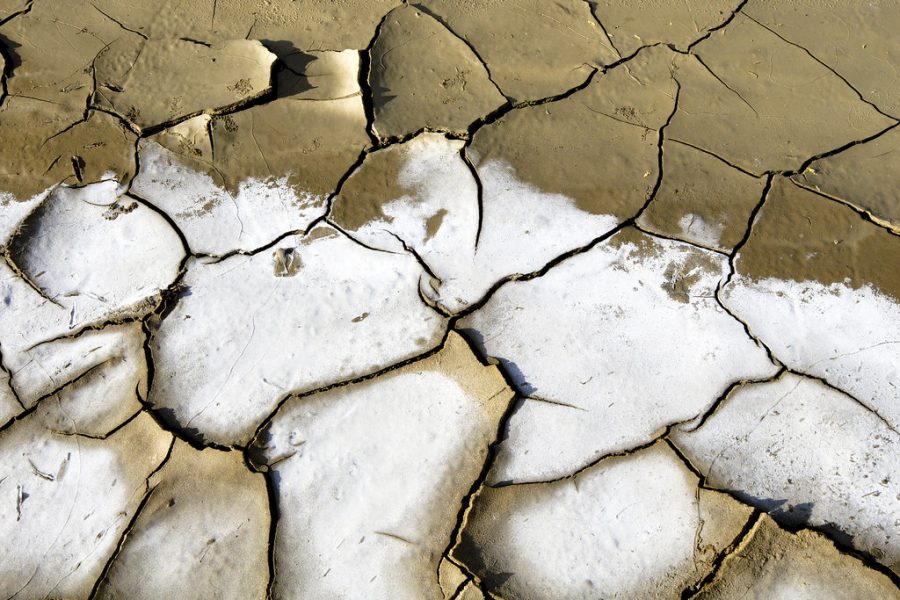Global water scarcity becomes a growing danger
Preventative action must be taken to halt the effects of climate change
UN photographer Martine Perret captures the effects of a drought on dry-land in Timor-Leste.
August 26, 2021
Around this time last year, I wrote an article for the Old Gold & Black describing the immediate need for international action on the wildfires raging across the American West and the rainforests of Brazil. My hypothesis was that a dramatic catastrophe could shock officials into making a substantive change, because today, preemptive legislation introduced in Congress is rare and seldom passed. This idea remains unchanged, regardless of how many catastrophic events have occurred since the time of my original writing. It has become clear that for actual work to be done, an incident worthy of the attention of the U.S. government must occur. Worse yet, this incident must be far more damaging than anything previously considered possible.
The alarming wildfires that occurred last year are still tearing apart Reno. Those wildfires — and the accompanying droughts — are symptomatic of a much larger problem that has received little effectual change (though the semantics of the term global warming have proven that it has received more than enough public attention).
It is redundant to point out that global warming is the reason behind all of the individual weather disasters. It isn’t enough that people know that it is a dangerous issue, because even then nothing is going to be done about it. Every day, the average American is being notified that if they don’t change the ways in which they utilize ‘essential services’ on a daily basis, their way of life will be totally destroyed.
But the average American is the wrong person to constantly inform about global warming. Instead, those who control the means of electricity and heat production must be constantly reminded. Government officials, the individuals who control policies that relate to fossil fuel emission and set agricultural subsidies, must be influenced in the intimate way that American citizens are being influenced.
Instead, the spotlight now must shine on solutions to the multiplying dangers that oppose vulnerable countries across the world. One such peril is the steadily increasing lack of clean water. One billion people — including 450 million children — live in areas of high or extremely high water vulnerability (per UNICEF, 2021).
Global warming has accelerated the water cycle, leading to an increased rate of evaporation from both soil and plants. In turn, this has led to a severe reduction of moisture in various land areas all over the world, areas where droughts have been more common, historically. As a direct result, we now live in a world in which eternal fires blaze across the United States. In the larger world, great river beds like the Rio Grande have been drained and reduced to cracked, dried mud.
The solution to climate problems like these does not lie in an emerging Canadian enterprise of harvesting icebergs — nor does it exist in the ancient desalination plants that are heavily depended on in countries like Saudi Arabia, Kuwait and Qatar. As technology advances, we must innovate less energy-intensive processes to generate clean water. We have to move away from power plants that pollute oceans with mass amounts of brine and the skies with smog.
Aquifers — one of the country’s greatest water resources — are a key factor in our preservation of clean drinking water for the growing global population. However, the historical trend regarding the major aquifers across the United States has proven unsustainable. A prevalent example of our inefficient use of aquifers can be found in the Ogallala aquifer, which has been overutilized for irrigation purposes. Water levels in this source have reportedly declined more than 100 feet in some areas (per USGS surveys).
The idea that a significant loss of life or property is necessary for action to be taken against issues like a lack of clean drinking water is not new by any means. At face value, it sounds excessive and harsh. Some people may draw the premature conclusion that I desire this destruction. This is not the case. I am not fear-mongering, and I am not writing this from an uneducated perspective.
Rather the truth that I have been driving at is this: until the destruction and death move to the front doorstep of Shell and Exxon Mobil executives — or any major international corporation — big businesses won’t abandon those practices that will make them the survivors of the hellscape that they have created.















